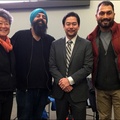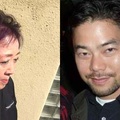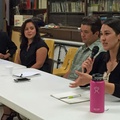“This actually happened. This happened to somebody I love,” stated poet and author Dwight Okita, in talking about why he writes poetry about the Japanese American World War II incarceration experience. “This can happen again, maybe to someone you love, or maybe to you. So let’s not repeat the mistakes of history.”
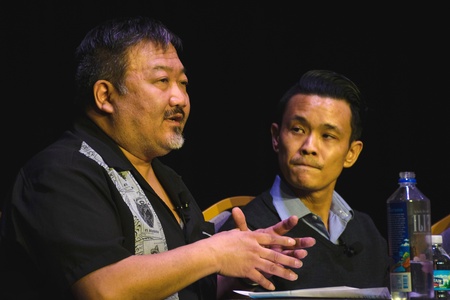
With a packed audience in attendance, Okita was joined at this year’s Day of Remembrance (DOR) main program by Jason Matsumoto, Executive Producer of the film “The Orange Story;” and Erika Street Hopman, Writer/Director of “The Orange Story;” Kazuko Golden, Writer and Director of the film “A Song for Manzanar;” and Dr. Richard Morimoto of Northwestern University, who served as the panel moderator. These artists spoke on the panel after Okita conducted a reading of his poetry and the filmmakers screened their respective films.
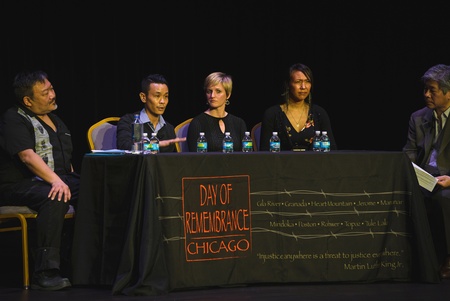
Organized by the Chicago Japanese American Council, the Chicago Japanese American Historical Society, the Japanese American Citizens League - Chicago Chapter, the Japanese American Service Committee, and the Japanese Mutual Aid Society of Chicago, this year’s Day of Remembrance activities marked 75 years since the signing of Executive Order 9066, in which President Franklin Delano Roosevelt authorized the incarceration of roughly 120,000 people in the Japanese American Concentration Camps during World War II.
Attendance at the main event at The Chicago History Museum included over 450 people, spurring the addition of a number of screenings of the films throughout the day.
Russell Lewis, Executive Vice President of the Chicago History Museum, and Jean Mishima, President of the Chicago Japanese American Historical Society, helped introduce the event, and community leader Anna Takada served as mistress of ceremonies. Representatives of the City of Chicago Mayor’s Office and of the Illinois State Governor’s Office, were present and issued proclamations recognizing this day. In addition, as part of the proceedings, Whitney M. Young Magnet High School student Zoe Ariyama read the wording of the evacuation order. Members of the Chicago Nisei Post No. 1183 served to open and close the ceremony with the posting and retiring of the colors.
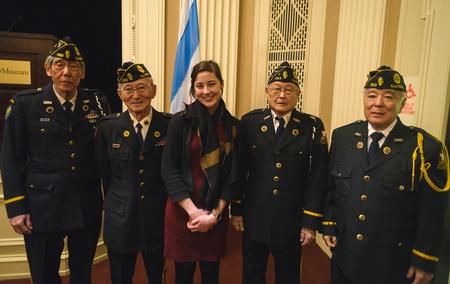
Earlier that day, an estimated 50 youth and parents attended a reading of “I am Yuki, a children’s story written by Clinical Assistant Professor Karen Su of the University of Illinois, Chicago.
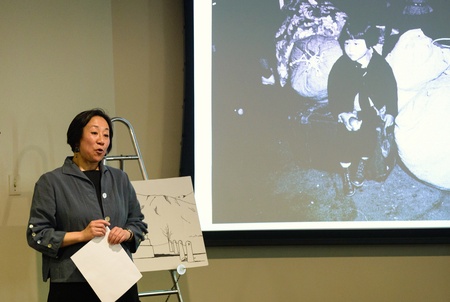
This year’s youth-oriented event, coordinated by Anna Takada and a number of young adult volunteers provided a special opportunity to pass down this important story of unjust incarceration to a new generation of children and youth.
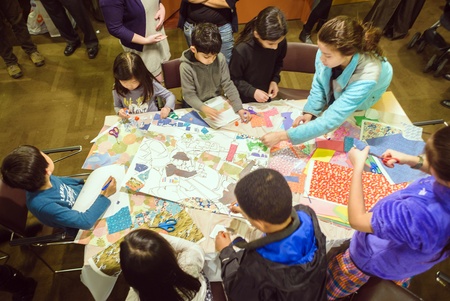
In addition, some 200 people attended an event the day before at the Block Museum at Northwestern University centered on an exhibit featuring work by artist Kristine Aono. At this event, attendees were able to contribute to Aono’s art piece by nailing a nail into her art piece as a way of commemorating the Japanese American incarcerees. In addition, break-out groups allowed attendees to hear directly from former incarcerees, such as Jane Hidaka, Yuki Hiyama, Enoch Kanaya, Jean Mishima, Jim Mita, and Merry Oya.
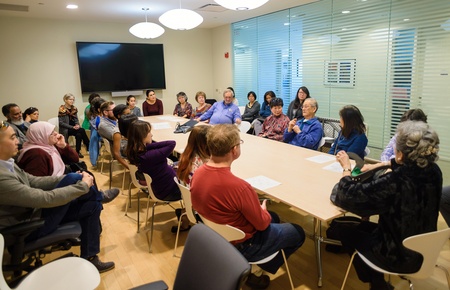
In sum, the events over the weekend allowed for an opportunity to bring home the human impacts of the incarceration experience.
As main event panelist Kazuko Golden stated, “In the final credits, we show a picture of a grocery store, and that was my grandfather’s grocery store. He had a home. He had a promising future with his new bride who came from Japan. And he went from that to four years later being in Chicago trying to just make it working at a paper mill.”
“What does it do to your self-esteem and confidence when you go from having a grocery store to struggling to be released and only finding factory work for your new bride?”
Golden continued by connecting the issues of JA incarceration to contemporary concerns over proposed government policies.
“We need to hear it. We need to hear the politicians saying it, and what exactly is the verbiage they’re using, and where are the policies changing, and where are the politicians standing in either building a more inclusive America, or an America that is making policies where they will be building walls that will put people that are safe for society behind bars.”
Panelist Jason Matsumoto also noted how he hopes to make more movies on the Japanese American incarceration experience, particularly in regards to the story of resettlement in Chicago.
As he stated, “There are so many ways that we can enrich the national story of this history if we focus on places like Chicago or the Midwest where people don’t know a lot about what happened here.”
Matsumoto further stressed his hopes that community members will be inspired by these films to become more involved.
“I have a family connection to this history, so it is a commemoration for me. It’s important to me from a very personal perspective. But I’m most interested, especially right now in this moment in time, in turning commemoration into action, and into activism.”
© 2017 Ryan Masaaki Yokota


